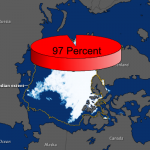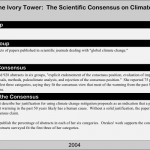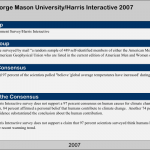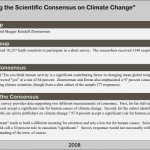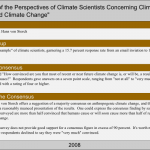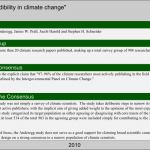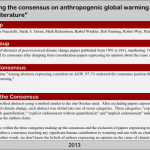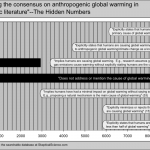Last week, we published a fact check of a new Organizing For Action campaign designed to expose Republican “climate change deniers” in Congress. One of the features of OFA’s attack ad was its claim of a 97 percent consensus among scientists on climate change.
We noticed a few problems with the support typically offered with that and similar claims, and promised a fact check of the 97 percent consensus claim. We stated that OFA’s claim about the scientific consensus is almost certainly false taken literally, but found that one can take it as true statement, albeit misleading, under a set of charitable assumptions.
The Truth About the 97 Percent Consensus
We found six evidences offered in support of a strong scientific consensus. The problems for each are similar, so we decided to treat all of them together with a slide show designed to highlight the keys to understanding the meaning of each study. For each study, we created an image that features the name of the study, the authors, the target group to which the consensus number applies, the consensus claim from the study, and finally our evaluation of the real nature of the consensus.
The most recent of the studies downplays some of the important numbers-behind-the-numbers, so we also included an explanatory graph to help expose the devils in the details.
- Oreskes
- Zimmerman
- Anderegg
We found the “consensus” varies in terms of the population expressing the consensus and in terms of the object of consensus. One researcher would look at one group or subgroup of scientists. Another researcher would focus on another. Sometimes the “consensus” position was vague, as with “the consensus position that humans are causing global warming.” Does that mean all of it, most of it or just some of it?
Is there a scientific consensus on global warming?
A consensus on global warming probably exists on the twin points that the planet is warming and that humans contribute to at least some significant degree. But none of these studies do a particularly good job of measuring a consensus. The von Storch effort probably comes closest since it surveyed a relatively large sample of scientists directly and asked some good questions. That survey is also notable for a large set of colorful responses to open-ended questions like “If you could ask the collective body of climate scientists one particular question, what would it be?” In the end, the survey suggests that about 84 percent of the scientists in the sample group are reasonably confident humans play a dominant role in climate change. About a third of the scientists in that survey said they were “very much” convinced humans now or will soon account for most of the effects of climate change.
Applying the information
Obviously consensus has its limits. While the backing of scientists reasonably adds some strength to a claim, science does not operate on the basis of democratic principles. A majority vote does not decide scientific truth.
We need to stay on guard for statements that pass one type of consensus off as a different type of consensus.
Examples:
Naomi Oreskes claimed her survey, the first to appear in our slide show, provided evidence confirming the IPCC consensus position, that humans likely account for most of global warming over the past 50 years by contributing to higher concentrations of greenhouse gases in the atmosphere. Yet only one of her six groups unequivocally fits with that consensus, and Oreskes does not share her measurement of the size of that group. Oreskes’ method encourages an exaggerated impression of consensus.
President Obama went to Twitter with his reaction to the Cook study:
Ninety-seven percent of scientists agree: #climate change is real, man-made and dangerous. Read more: http://t.co/4lEEBYtVqf
— Barack Obama (@BarackObama) May 16, 2013
We’re inclined to go easy on imprecision in Twitter communications because of the 140 character limit, but the example is too good to pass up. The Cook study looked at professional literature, not at scientists, and excluded from its consensus calculation most of the professional literature where it expressed no explicit or implicit view on the cause of climate change. The study does a poor job of quantifying the scientific view of the human contribution to warming and does not examine the issue of the dangers posed by climate change.
We repeatedly see consensus claims presented in ways that encourage the audience to accept an exaggerated consensus. We shouldn’t see that from scientists, and we shouldn’t see it from journalists. We shouldn’t even see it from presidents.
Correction 8/31/2013: Removed redundant occurrence of the word “human” from slide No. 2.
Update, correction 5/20/2013: Changed our presentation format, updated von Storch study summary to correct a minor typo.
Update 5/25/2013: Updated Anderegg study summary fixing a grammatical error.
References
“Scientific Opinion on Climate Change.” Wikipedia. Wikimedia Foundation, 21 Aug. 2013. Web. 26 Aug. 2013.
Oreskes, Naomi. “Beyond the Ivory Tower: The Scientific Consensus on Climate Change.” Sciencemag.org. American Association for the Advancement of Science, 3 Dec. 2004. Web. 26 Aug. 2013.
Oreskes, Naomi. “Beyond the Ivory Tower: The Scientific Consensus on Climate Change.” Center for Marine Biodiversity and Conservation. Scripps Institution of Oceanography, UC San Diego, 21 Jan. 2005. Web. 28 Aug. 2013.
Lichter, S. Robert, Ph.D. “Climate Scientists Agree on Warming, Disagree on Dangers, and Don’t Trust the Media’s Coverage of Climate Change.” Stats.org. Statistical Assessment Service, 24 Apr. 2008. Web. 26 Aug. 2013.
Bray, D., and H. von Storch. “CliSci2008: A Survey of the Perspectives of Climate Scientists Concerning Climate Science and Climate Change.” Academia.edu. Academia, Sept. 2010. Web. 26 Aug. 2013.
Doran, Peter T., and Maggie Kendall Zimmerman. “Examining the Scientific Consensus on Climate Change.” UIC. University of Illinois at Chicago, 20 Jan. 2009. Web. 26 Aug. 2013.
Anderegg, William R. L., James W. Prall, Jacob Harold, and Stephen H. Schneider. “Expert Credibility in Climate Change.” PNAS.org. National Academy of Sciences, 9 Apr. 2010. Web. 26 Aug. 2013.
Anderegg, William R. L., James W. Prall, Jacob Harold, and Stephen H. Schneider. “Expert Credibility in Climate Change: Supporting Information.” PNAS.org. National Academy of Sciences, 9 Apr. 2010. Web. 26 Aug. 2013.
Prall, James W. “Links to Source Documents on Climate Authors’ Positions.” Utoronto.ca/~prall. University of Toronto, n.d. Web. 26 Aug. 2013.
“CMOS Media / Médias De La SCMO.” CMOS Media / Médias De La SCMO. Canadian Meteorological and Oceanographic Society, n.d. Web. 26 Aug. 2013.
“An Open Letter on Climate Change Science to All Canadian Elected Government Leaders.” CMOS.ca. Canadian Meteorological and Oceanographic Society, June 2008. Web. 27 Aug. 2013.
“2007 Bali Climate Declaration by Scientists.” Climate Change Research Centre. University of New South Wales, 2007. Web. 27 Aug. 2013.
“The Great Global Warming Swindle: Open Letter to Martin Durkin from 37 Signatories (April 2007).” Climate of Denial. N.p., Apr. 2007. Web. 27 Aug. 2013.
“Annex II: Contributors to the IPCC WGI Fourth Assessment Report.” IPCC.ch. Intergovernmental Panel on Climate Change, n.d. Web. 27 Aug. 2013.
“An Open Letter to the Prime Minister of Canada on Climate Change Science.” CMOS.ca. Canadian Meteorological and Oceanography Society, 18 Apr. 2006. Web. 27 Aug. 2013.
Cook, John, Dana Nuccitelli, Sarah A. Green, Mark Richardson, Bärbel Winkler, Rob Painting, Robert Way, Peter Jacobs, and Andrew Skuce. “Quantifying the Consensus on Anthropogenic Global Warming in the Scientific Literature.” IOPscience.iop.org. IOP Publishing, 15 May 2013. Web. 20 Aug. 2013.
Cook, John, Dana Nuccitelli, Sarah A. Green, Mark Richardson, Bärbel Winkler, Rob Painting, Robert Way, Peter Jacobs, and Andrew Skuce. “Quantifying the Consensus on Anthropogenic Global Warming in the Scientific Literature: Supplementary Information.” IOPscience.iop.org. IOP Publishing, 15 May 2013. Web. 20 Aug. 2013.
Cook, John, Dana Nuccitelli, Sarah A. Green, Mark Richardson, Bärbel Winkler, Rob Painting, Robert Way, Peter Jacobs, and Andrew Skuce. “Quantifying the Consensus on Anthropogenic Global Warming in the Scientific Literature: Data file.” IOPscience.iop.org. IOP Publishing, 15 May 2013. Web. 20 Aug. 2013.
“The Consensus Project.” Skeptical Science. John Cook, 2013. Web. 27 Aug. 2013.
“Scientific Consensus On Anthropogenic Climate Change.” ScienceDaily. ScienceDaily, 15 May 2013. Web. 27 Aug. 2013.
Andrew. “97% Study Falsely Classifies Scientists’ Papers, According to the Scientists That Published Them.” PopularTechnology.net. Popular Technology, 21 May 2013. Web. 27 Aug. 2013.
Pile, Ben. “Tom Curtis Doesn’t Understand the 97% Paper.” Climate Resistance. Climate Resistance, 27 July 2013. Web. 27 Aug. 2013.
Goot, Murray. “Climate Scientists and the Consensus on Climate Change: The Bray and Von Storch Surveys, 1996 – 2008.” Garnaut Review. Garnaut Climate Change Review, 2011. Web. 27 Aug. 2013.
Strauss, Valerie. “Obama Tweet Gets Australian Researcher Big Attention.” The Answer Sheet. The Washington Post, 17 May 2013. Web. 27 Aug. 2013.
